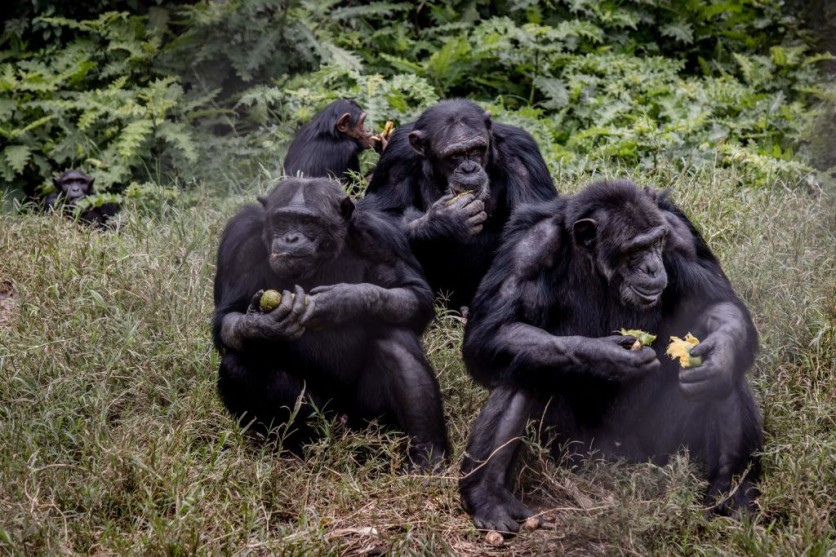A groundbreaking study conducted by researchers at the University of California, Berkeley, and Johns Hopkins University has revealed that chimpanzees and bonobos possess the ability to recognize family and friends, even after decades of separation.

(Photo : GUERCHOM NDEBO/AFP via Getty Images)
Chimpanzees eat their lunch at the Lwiro Primate Rehabilitation Center, 45 km from the city of Bukavu, February 14, 2022.
Revealing Apes' Long-Term Memory
This discovery challenges the existing record held by dolphins for the longest non-human memory and suggests that humans share remarkable similarities with these close relatives in the animal kingdom, as reported by Interesting Engineering.
The study sheds light on the intriguing question of how humans developed long-term memory, a puzzle that has intrigued researchers for years. In an era before rapid transportation and communication, humans maintained intergroup trade even after extended periods of separation.
This evidence highlights the significance of long-term memory as a foundational element of human culture, simultaneously prompting inquiries into evolutionary biology and psychology.
While previous research crowned dolphins as champions in social memory, recalling vocalizations even after two decades, recent studies in apes have now claimed the record for the longest-lasting non-human memory.
Primate researchers have frequently noted the remarkable ability of the animals they study to remember them even after extended periods of separation.
Christopher Krupenye, assistant professor at John Hopkins University and a participant in the research, highlighted the animals' distinct recognition, expressing excitement upon seeing familiar faces again.
Validating Observations
To validate these observations with empirical data, a team led by Krupenye and Laura Simone Lewis, a biological anthropologist and comparative psychologist at the University of California, Berkeley, embarked on a mission.
Their objective was to investigate the duration of memory retention in apes, aiming to determine how long they recall their peers.
Executing such an experiment required meticulous groundwork, involving an in-depth understanding of the genealogy of the animals under study and the procurement of images for the testing process.
Collaborating with chimpanzees and bonobos at Edinburgh Zoo in Scotland, Planckendael Zoo in Belgium, and Kumamoto Sanctuary in Japan, the research team sought to identify individuals who had separated after spending a year or more together.
Their mission involved tracking down the positive or negative interactions between these former groupmates and locating images around the time of separation. Despite facing challenges, particularly for periods lacking high-quality images, the team managed to gather visual data for 26 chimps and bonobos.
Executing the experiment, The Guardian reported that the researchers set up a computer equipped with sensitive cameras and a non-invasive eye-tracking system.
The participants were allowed to sip diluted juice while viewing pairs of images on the computer screen-one featuring a separated groupmate and the other a total stranger. Eye-tracking cameras recorded the time spent on each image.
Comparisons with humans, where memory decline may start after 15 years, but recall has been documented up to 48 years after separation, indicate a shared existence of long-term memory in a common ancestor that lived between six and nine million years ago.
While the researchers are uncertain about the specific neural processes occurring when the apes viewed these images, these are the questions they aspire to address in their future research endeavors. The findings from the study were published in the journal Proceedings of the National Academy of Sciences.

ⓒ 2026 TECHTIMES.com All rights reserved. Do not reproduce without permission.




